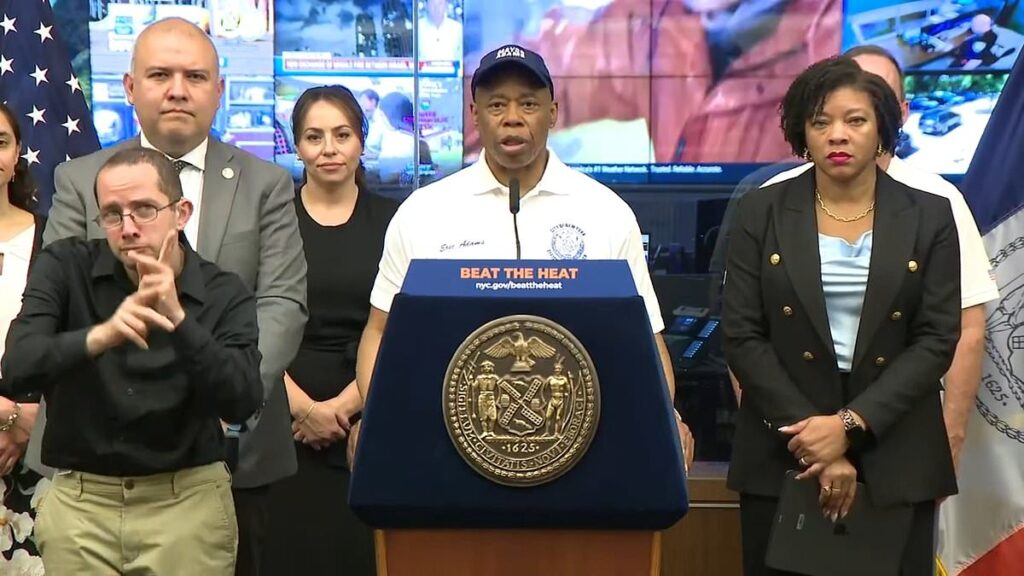The East Coast is bracing for extreme temperatures as major cities open shelters for vulnerable populations to escape the unbearable heat.
Tens of millions of people are under extreme advisories as a heat dome shifts from the Midwest to the Northeast.
A heat dome, a high-pressure system that traps hot air and blocks cooler air, is driving prolonged heat waves across the US.
New York City, Boston and Philadelphia issued extreme heat warnings that went into effect on Sunday, while Washington DC and Baltimore’s warnings will begin on Monday.
These areas are expected to see temperatures exceeding 100 degrees, lasting at least until the middle of the week.
If East Coasters do not properly prepare for the scorching weather, the consequences could be dire.
‘Summer in the city is here – and so is our first heat wave of the year,’ NYC Mayor Eric Adams announced at a Saturday press conference.
‘This extreme heat will not just be uncomfortable and oppressive, it will be brutal and it will be dangerous to those who spend extended periods outside.’
Adding the potentially record-breaking heat wave could be ‘deadly and life threatening,’ he outlined NYC’s plan to protect residents – especially those most at risk.
NYC Mayor Eric Adams warned about the heat wave at a Saturday press conference (pictured)
Tens of millions of people are under extreme advisories as a heat dome shifts from the Midwest to the Northeast
Groups particularly vulnerable and at risk of heat-related illnesses include people aged 60 and over, young children and people with pre-existing health conditions (pictured: New Yorkers sitting in the heat)
When temperatures are forecasted to reach 95 degrees or higher for one or more days, or 100 degrees or higher for two or more days, the NYC Department of Social Services issues a Code Red Alert.
From Sunday to Wednesday, the Big Apple will likely see temperatures around 100 degrees each day, with the heat spiking on Monday and Tuesday at 105 degrees, according to ABC.
Under the alert, those ‘experiencing heat-related discomfort’ can visit designated shelters to get a break from the sweltering conditions outside.
NYC has rolled out a plan to help vulnerable residents stay safe and cool during the heat wave
The groups particularly at risk of heat related illnesses include people aged 60 and over, young children and those with pre-existing health conditions.
New York City Emergency Management Department Zach Iscol said the city is rolling out its emergency response on Sunday, offering 248 cooling shelters to vulnerable New Yorkers.
These locations include libraries and other community spaces.
Iscol also urged people to ‘take the heat seriously’ by staying hydrated, avoiding strenuous outdoor tasks and finding places to cool off.
Mayor Michelle Wu of Boston has also warned her residents of the heat’s severity.
Boston has ‘splash pads’ open at playgrounds and parks around the city, as well as public pools and cooling centers.
Philadelphia’s health commissioner, Dr. Palak Raval-Nelson, has issued a Heat Health Emergency in the Pennsylvania city.
Cooling Center locations in NYC include libraries and other community spaces (pictured: Battery Park Library)
New York City, Boston and Philadelphia issued extreme heat warnings that went into effect on Sunday, while Washington DC and Baltimore’s warnings will begin on Monday
‘The best way to protect our loved ones is to make sure they can get into air conditioning during the hottest part of the day,’ he said on Friday.
Extreme heat has been a leading cause of all weather-related deaths over the last 30 years.
In 2023, roughly 2,300 Americans died from the heat, according to The Weather Channel.
‘Extreme heat is tragically the leading cause of weather-related fatalities in America,’ AccuWeather Chief Meteorologist Jonathan Porter said.
‘There is an amplified risk of heat-related illnesses because this is the first heat wave of the year for millions of people, and their bodies are not yet acclimated to this type of heat and humidity’
The National Weather Service urges residents to drink plenty of fluids, stay in air-conditioned spaces, avoid direct sunlight, and check on vulnerable neighbors.

